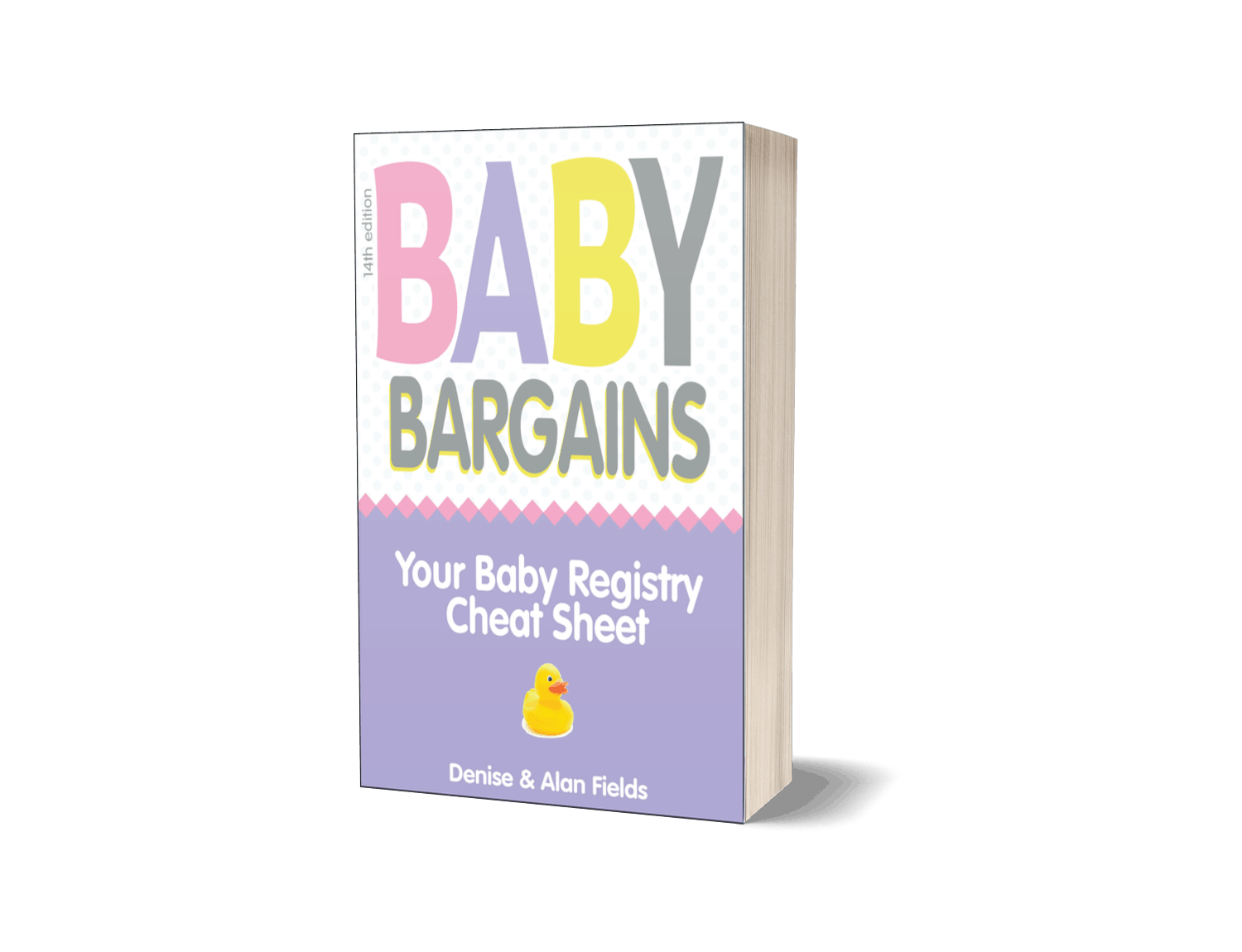We’re back from the baby products show in Vegas with news on the plastic bottle front. (In case you are new to this blog, we pulled our recommendation of polycarbonate baby bottles after a federal report raised health concerns about a chemical (BPA) that leaches from the bottles with normal use).
As we headed off to the trade show, we received a statement from Carolyn Hentschell, president of Handi-Craft/Dr. Brown’s (Dr. Brown’s is the #2 seller of polycarbonate baby bottles, behind Avent).
In the statement, Hentschell reveals that Dr. Brown’s will not only debut a glass version shortly, but also a polypropylene bottle (a different type of plastic that does NOT have the safety concerns that have been raised about polycarbonate). Here’s the statement:
Dr. Brown’s will soon be producing glass bottles, and I wanted to offer a little more information. The new bottles will make their debut in a few months. We are also planning to manufacture polypropylene bottles which should be available following the glass bottles. All our bottle types will include our patented vent system – developed by a doctor for the health and well-being of babies – which reduces feeding problems like colic, spit-up, burping and gas.
Over the past few months there has been increasing interest from retailers and moms for a choice in bottle materials. So now, parents will have choices that allow them to continue to use Dr. Brown’s baby bottles. These alternate materials are not a replacement to our current materials but rather a line extension. Now parents have more choices.
We continue to be completely convinced with the overwhelming body of scientific evidence from around the world that deems polycarbonate plastic to be safe for use with baby bottles. Our goal is to adjust to current market demand and to allow all customers access to our vented technology.
We will be sure to let your readers know when our new bottles hit the market.
We met with Hentschell and Dr. Brown’s at the trade show and appreciated their response to the concerns raised about BPA and polycarbonate bottles. While we realize polycarbonate baby bottles are in a tough spot here (they can’t concede their product might be dangerous, but they also don’t want to deaf to parent concerns), we thought Dr. Brown had the position: give parents the CHOICE of different bottles.
Meanwhile, in other news, Evenflo has announced it will phase out polycarbonate baby bottles in 2008. That’s big news, as Evenflo is a big baby bottle seller. Evenflo makes a wide variety of glass, polypropylene and polycarbonate bottles. So, starting next year, Evenflo will only sell glass and polypropylene.
Evenflo has seen a sharp rise in glass bottle sales, as it is one of the few glass bottle makers in the U.S. It’s unclear what percentage of Evenflo’s bottle sales are polycarbonate, but clearly the company is far behind Avent and Dr. Brown’s in polycarbonate sales—so while this change may be more symbolic than significant, it does mark the first time a major baby bottle maker has made such a move.
Finally we met with Avent—Avent’s executives kept a good poker face during our meeting, saying didn’t plan to change a thing with their bottle line. They are sticking with polycarbonate.
So, that’s the news! We’ll continue to follow this issue and post developments as they happen.

 We obsess over gear for families . . . so you don't have to. Baby Bargains has one mission: help you find the best gear for your family and home with unbiased reviews by experts with 20 years of experience. At prices that don't break the bank. When you purchase a product from links on this site, we make a small affiliate commission. Learn more
We obsess over gear for families . . . so you don't have to. Baby Bargains has one mission: help you find the best gear for your family and home with unbiased reviews by experts with 20 years of experience. At prices that don't break the bank. When you purchase a product from links on this site, we make a small affiliate commission. Learn more 

i was wondering if the internal vents are made of material that contains BPA? i am really happy that the BPA free bottles from dr. brown have come out…
i was wondering if the internal vents are made of material that contains BPA? i am really happy that the BPA free bottles from dr. brown have come out…
has there ben any recall of any kind on dr browns bottles ???
has there ben any recall of any kind on dr browns bottles ???
We have the BPA Free Glass bottles on our site with silicone nipples. We also have lot of other products like stainless steel bottles to help reduce garbage going into landfill.
Thanks and let us know if you like the products and ideas we are promoting.
http://www.envirobottles.ca
Thanks
Corey
We have the BPA Free Glass bottles on our site with silicone nipples. We also have lot of other products like stainless steel bottles to help reduce garbage going into landfill.
Thanks and let us know if you like the products and ideas we are promoting.
http://www.envirobottles.ca
Thanks
Corey
I went to Walmart last night to buy my baby more bottles and found a sign saying the bottles I have been using have been recalled.(Dr. Brown) What about the risks envolved in feeding my baby from these bottles. I have been told they are toxic. What am I supposed to do??? Why aren’t these bottles tested BEFORE they are put on the market???
I went to Walmart last night to buy my baby more bottles and found a sign saying the bottles I have been using have been recalled.(Dr. Brown) What about the risks envolved in feeding my baby from these bottles. I have been told they are toxic. What am I supposed to do??? Why aren’t these bottles tested BEFORE they are put on the market???
i was wondering about the nipples and also the nipple shields that is use for breast feeding? is there a recall for those. and also pacifiers??
i was wondering about the nipples and also the nipple shields that is use for breast feeding? is there a recall for those. and also pacifiers??
Can’t boiling them make them ok??? Can I sue for not testing these bottles before they were put on the market?? What now don’t use Dr Browns bottles??? How long did they know they had toxic in them?? My son is already used to these bottles only. I think these bottles should come off the shelf!!!!
Can’t boiling them make them ok??? Can I sue for not testing these bottles before they were put on the market?? What now don’t use Dr Browns bottles??? How long did they know they had toxic in them?? My son is already used to these bottles only. I think these bottles should come off the shelf!!!!
Hi Claudia!
Actually, research on this issue shows that boiling BPA bottles will cause more of the chemical to leach out. We recommend you stop using them. Please see our earlier discussion of BPA and baby bottle on this blog. If you bought them from Babies R Us, some stores are quietly accepting returns. Otherwise, please throw them out and replace them with non-BPA bottles, which are now on the shelves!
Best wishes,
Alan & Denise Fields
Denise and Alan Fields
authors, Baby Bargains
Hi Claudia!
Actually, research on this issue shows that boiling BPA bottles will cause more of the chemical to leach out. We recommend you stop using them. Please see our earlier discussion of BPA and baby bottle on this blog. If you bought them from Babies R Us, some stores are quietly accepting returns. Otherwise, please throw them out and replace them with non-BPA bottles, which are now on the shelves!
Best wishes,
Alan & Denise Fields
Denise and Alan Fields
authors, Baby Bargains
I bought some Dr Browns bottles but they say without BPA is that true? Did they make some without BPA in them?? What are some good bottles to guy for babies? Are Avent bottles toxic too?
I bought some Dr Browns bottles but they say without BPA is that true? Did they make some without BPA in them?? What are some good bottles to guy for babies? Are Avent bottles toxic too?
I am a pediatric RN and have found that many of our infants with aspiration pneumonia were using Dr. Brown’s baby bottles- after investigating, it was quite simple that since the formula flows easily, the infant does not have to suck, thus allowing for the infant to aspirate. Parents are not cautious with bottle feeding and need to be sure to not prop, always hold and observe the infant during feeding. I believe that this bottle has increased the incidence of aspiration pneumonia,as evidenced by the admissions we have seen with parents using this form of feeding. Parents also feel since it reduces the amt. of air that the baby does not need to take the time to burp, this actually is a feeding break for the baby. It is important to allow the infant to break,burp, rest, just as the normal breastfeeding infant does. Please inform your friends, and family of the concerns with this bottle.
I am a pediatric RN and have found that many of our infants with aspiration pneumonia were using Dr. Brown’s baby bottles- after investigating, it was quite simple that since the formula flows easily, the infant does not have to suck, thus allowing for the infant to aspirate. Parents are not cautious with bottle feeding and need to be sure to not prop, always hold and observe the infant during feeding. I believe that this bottle has increased the incidence of aspiration pneumonia,as evidenced by the admissions we have seen with parents using this form of feeding. Parents also feel since it reduces the amt. of air that the baby does not need to take the time to burp, this actually is a feeding break for the baby. It is important to allow the infant to break,burp, rest, just as the normal breastfeeding infant does. Please inform your friends, and family of the concerns with this bottle.